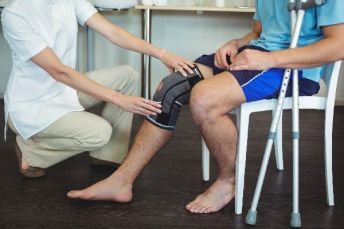 Much like knee surgery, hip replacement surgery is an incredibly grueling procedure. While an anterior hip replacement is quite a bit less invasive, major operations can entail a significant amount of downtime. As such, there are a few key things that your hip replacement surgeon should know before your procedure is started.
Much like knee surgery, hip replacement surgery is an incredibly grueling procedure. While an anterior hip replacement is quite a bit less invasive, major operations can entail a significant amount of downtime. As such, there are a few key things that your hip replacement surgeon should know before your procedure is started.
First, the state of your general health is critical. This surgery is going to place a lot of strain on your body. Your provider will need to know that your heart, organs, and body systems will be able to stand up to the stress. Make sure to schedule an appointment with your general doctor to have a comprehensive health exam performed at least one to two months ahead of your surgery.
Your provider will need to know all about any medications that you are currently using. This point remains true even if your regular doctor has prescribed these medications. Certain drugs increase the risk of uncontrolled bleeding, and they may additionally cause problems with blood clotting. You will need to discontinue these products approximately two to three weeks before invasive treatment as recommended by your doctor.
It is vital to note that you should additionally tell your provider about any supplements or over the counter (OTC) medications that you are using. Some of these products can have the same effects as prescription-strength blood-thinning drugs. These include aspirin and Ibuprofen, as well as all other non-steroidal anti-inflammatory drugs (NSAIDs). You will have to find alternative forms of pain relief, and you should temporarily discontinue any aspirin therapies.
Any chronic health issues that you have should be brought to the attention of your surgical team right away. These will need to be fully controlled via medication or lifestyle adjustments at the time of your procedure. These include illnesses such as diabetes, hypertension, and high cholesterol. You should not undergo any surgery until each of these conditions is completely stabilized.
To answer any questions about hip replacement surgery, contact Dr. Dan Albright at 919-863-6808.

 It is vital to maintain strong, healthy knees to perform daily activities. A single fall can keep you from enjoying leisure activities or carrying out your everyday routine. An operation may be needed to resolve an issue and get you back to health. On average, it takes six months for recovery and up to a year before being able to do strenuous physical activities. There are several tips to help with a faster recovery after
It is vital to maintain strong, healthy knees to perform daily activities. A single fall can keep you from enjoying leisure activities or carrying out your everyday routine. An operation may be needed to resolve an issue and get you back to health. On average, it takes six months for recovery and up to a year before being able to do strenuous physical activities. There are several tips to help with a faster recovery after  If you are planning on having your knee repaired or replaced, it is crucial to keep your doctors informed of changes in health or habits. Without this information, these professionals cannot possibly deliver the level of needs-specific care and attention that you require. Following are a few things that your
If you are planning on having your knee repaired or replaced, it is crucial to keep your doctors informed of changes in health or habits. Without this information, these professionals cannot possibly deliver the level of needs-specific care and attention that you require. Following are a few things that your  Orthopedic surgeons specialize in correcting deformities of muscles or bones due to disease or injury. They have years of extensive experience examining and diagnosing these ailments. From surgical procedures to corrective therapies,
Orthopedic surgeons specialize in correcting deformities of muscles or bones due to disease or injury. They have years of extensive experience examining and diagnosing these ailments. From surgical procedures to corrective therapies,  When the joints start to wear down beyond the point of usability, even seemingly minor tasks can be challenging if not downright impossible. This situation is undoubtedly the case with the hips. Getting up and down from a sitting position, standing for any significant amount of time, walking, and even lying prone can all be extraordinarily painful. In these and other instances, there may come a time when
When the joints start to wear down beyond the point of usability, even seemingly minor tasks can be challenging if not downright impossible. This situation is undoubtedly the case with the hips. Getting up and down from a sitting position, standing for any significant amount of time, walking, and even lying prone can all be extraordinarily painful. In these and other instances, there may come a time when  The legs are the human body’s wheels that carry us from place to place. However, knee pain can be debilitating and prevent standard functionality and performance. Whether due to water build-up, loose cartilage, or swelling and arthritis,
The legs are the human body’s wheels that carry us from place to place. However, knee pain can be debilitating and prevent standard functionality and performance. Whether due to water build-up, loose cartilage, or swelling and arthritis, 


